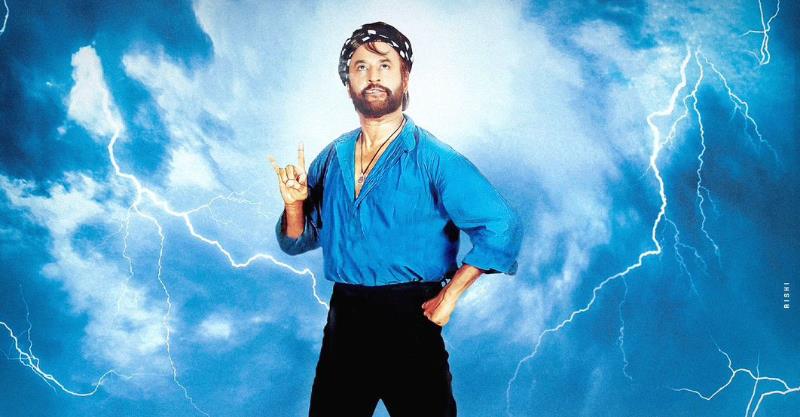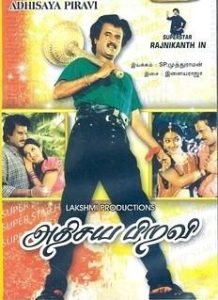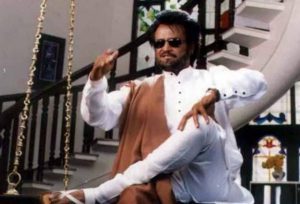
Baba review: Rajini’s cult film holds little appeal for a 2022 audience
The 2002 film, which has been re-released for Rajini’s birthday, comes across as ‘cringeworthy’ for a different generation – a new audience that has seen his more sophisticated films

As ‘Thalaivar’ Rajinikanth turns 72, his fans have received an unusual treat. However, the verdict is still out on whether or not it really is a treat.
To celebrate the Tamil superstar’s birthday (December 12), PVR Cinemas decided to screen five of Rajini’s films – Baba, Kabali, 2.0, Sivaji and Darbar – in select theatres in Chennai and Coimbatore.
The screening is part of a trend flagged off by PVR Cinemas, one of the largest film exhibitors in the country. PVR has been screening iconic films of some of the biggest movie stars, such as Dilip Kumar, Amitabh Bachchan and Shah Rukh Khan, during their birthdays. These films are screened in select theatres across the country. To tap the opportunity, the makers of the 2002 film Baba re-released the film with some fresh edits, hoping to pull in the crowd.
Also read: Baba returns: Rajinikanth hopes to ride fantasy wave with 20-yr-old film
Baba was one of Rajini’s rare flop films. But, though it failed at the box-office, it subsequently developed a cult status after repeated screening on television. Some of Rajini’s dialogues and hand gestures from the film are popular to this day.
Now, the re-release may have undone some of that. The film, which was once considered ‘heroic’ by the megastar’s fans, now seems ‘cringeworthy’ to a different generation — a new audience altogether.
A hero who has no death
In many ways, Baba was different from Rajini’s earlier films. His films usually had a template: a poor hero with a good heart, a monstrous villain who tried to prevent his growth, a woman who was always following the hero to only fall in love with him, and the customary comic actors — the ‘sidekicks’ to praise the hero.

Till the time Rajini was a performer, at least into the 1990s, he acted in films in which there was no hero worship. The year 1990 was a milestone, for that was when Athisaya Piravi was released. In this film, the hero is reincarnated and returns to earth after death.
It is said that yesteryear superstar MGR’s fan base never accepted any of his films which showed the actor dying. The same applied to Rajini.
The film Baba is no different. Though, in the climax, a pyre is lit to burn Rajini’s character alive, he is saved by God’s grace. This ‘divine’ help was perhaps what proved to be the film’s undoing. It flopped because Rajini’s fans truly believed the hero himself was a ‘superpower’, and they were not ready to accept another superpower coming to his rescue.
A failure against odds
In 1985, the Tamil film Sri Raghavendra, a biopic of the Hindu saint Raghavendra, a proponent of Dvaita philosophy, was released. Rajini played the titular role in the film, which was directed by SP Muthuraman, known for his commercial hits with the actor.
The film was produced by the master filmmaker K Balachander and music was scored by Ilaiyaraaja. Despite all these factors, the film bombed at the box-office. The failure of this film, however, didn’t stop the actor from embracing a spiritually themed script again. Despite having Suresh Krissna and AR Rahman, and bankrolled by the actor himself, Baba didn’t do well. Additionally, the timing was bad.

It is interesting to note that the film was released after a three year gap following Padayappa (1999), which was a superhit. The main reason for Padayappa’s grand success was that the script portrayed a tough and hard woman (Neelambari, played by Ramya Krishnan) as a villain. In reality, the actor had skirmishes with the former Chief Minister J Jayalalithaa at that time and the political undertones gave a boost to the film.
Chandramukhi, released in 2005, also became a hit. That film also had a woman (Chandramukhi, played by Jyothika) as the villain.
Also read: Kantara: Rajinikanth calls it a ‘masterpiece’; praises Rishab Shetty
Today, Padayappa and even Chandramukhi would get called out for their blatant patriarchy and misogyny, but those were less woke times. The Tamil audience liked the hero ‘controlling’ the woman, and this always worked in Rajini’s films.
Political undertones
Baba had men as villains. If one sees the film for the first time now, one may relate the villain roles with former Tamil Nadu Chief Minister M Karunanidhi and his political heir MK Stalin. Interestingly, the film shows the Deputy CM’s (Ippo Ramasamy, played by Ashish Vidyarthi) father Kanagaraj (an unidentified actor whose face was not revealed) as a wheelchair-bound politician.
But, in reality, the actor didn’t hold any grudge against the DMK patriarch, except for the fact that Kollywood was allegedly pressured to attend every political function organised by the dominant regional party. On the other hand, he got threats from the Pattali Makkal Katchi (PMK) for his smoking scenes, and it is said that this angered the actor. And, he went on to name the villain character as Ippo Ramasamy, which bears some similarity to Dr Ramadoss, the PMK chief.
Allegedly following threats, the actor had extended his support to the BJP-AIADMK alliance in the 2004 elections. That apart, there was no perceived arimony between him and the DMK.
No more politics
An atheist accepting God is the simple premise of Baba. The atheist (Baba, played by Rajini) is the reincarnation of a saint who was himself a devotee of Mahavatar Babaji. Initially, Baba indulges in all the ‘sins’ — alcohol, tobacco and so on. How he ‘finds’ God, giving up the sins in the process, forms the crux of the film.
In the original version, the hero is given seven mantras that he can use for the welfare of others. If he uses them for his own benefit, then he would be cursed to be born again in this world instead of attaining moksha.
Also read: Rajinikanth set for guest appearance in Aishwarya Rajinikanths Lal Salaam
He uses the last mantra to elect a good-hearted politician, Kandhan (played by Bharathi Mani) as CM. But, in the climax, Kandhan gets killed by the villains, suggesting the CM’s chair is ready for occupation. At the same time, Rajini gets orders from the saints to return to the Himalayas, since he passed the test of not using those seven mantras for his own benefit.
Given the choice of either returning to the Himalayas with the saints or going back to the mundane world, the hero chooses the latter. When the film was released in 2002, the climax clearly indicated that Rajini could enter politics.
In the re-edited version, the seven mantras have been trimmed to five. It will be a spoiler to reveal how the climax has been re-edited. Suffice it to say that Rajini has sought to put to rest suggestions that he will take up politics.
The re-edit factor
The re-edit has made the colour gradation sharper, and AR Rahman’s music (he had scored the music for the original, too), is peppy. The improvements end right there. Some of the dialogues — “women belong at home and men belong outside home” — which the audience listened to without batting an eyelid then seem cringeworthy now. The action and fight scenes are again incongruent with current times. The audience has evolved while the film has not aged well.
The theatre this writer went to had very few of Rajini’s ‘older’ fans who may have identified better with Baba. It was filled with youngsters who have grown up on a diet of more sophisticated Rajini films, such as 2.0, Petta and Kaala. To them, the re-edited version offered neither sentimental appeal nor creative delight.
Truly, Rajini is at his best when he does formulaic films sans political punch dialogues and spirituality. And those that belong to the current period.

